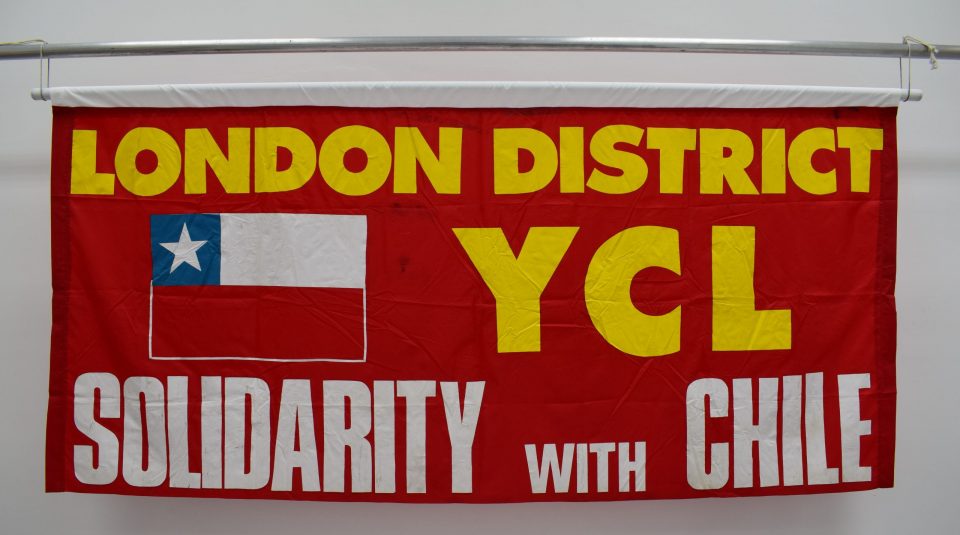
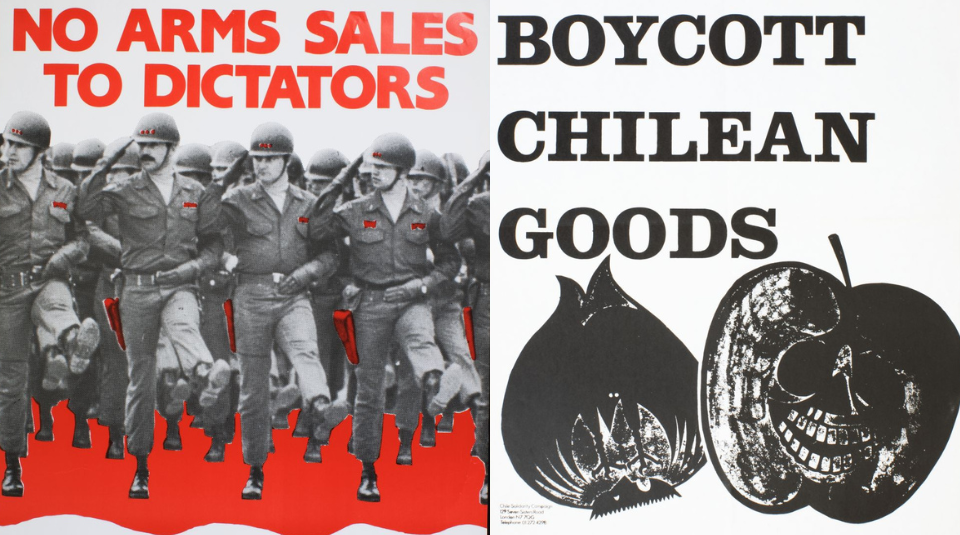
2023 marked 50 years since the Chilean military coup of 1973, during which time democratically elected socialist leader President Salvador Allende was killed. The coup led to international outcry. In the aftermath, individuals and organisations around the UK rallied to Chile’s aid. Campaigners demanded human rights for the people of Chile, protesting the violent repression of the country’s dictator General Augusto Pinochet.
Freelance writer Carole Concha Bell arrived in the UK with her family as a child refugee fleeing the Pinochet regime in 1975, and is a founding member of the Chile Solidarity Network and press officer for Mapuche International Link. In this blog, she reflects on the Chile Solidarity Campaign (CSC) that emerged in Britain.
President Salvador Allende was elected by the Chilean people in 1970, on a radical social change agenda that would ensure better conditions including access to education, health, and employment for Chile’s working class people. Allende also nationalised Chile’s natural assets including copper. This policy was called ’La vía chilena al socialismo’ (‘The Chilean way to socialism’). Chile’s rich elite and landowners were not happy with the social changes taking place. A campaign against Allende’s reforms was mounted by some sectors of the press backed by the elites and foreign investors. On 11 September 1973, President Salvador Allende was killed at the presidential headquarters and the country was violently seized by a military junta, led by General Augusto Pinochet, that would remain in power for 17 years. Allende’s supporters were arrested, tortured, killed, and exiled.
3,000 Chilean refugees arrived in Britain between 1974 and 1979, but their entry to the UK was not easy. There was a Conservative government led by Prime Minister Edward Heath that resisted helping Pinochet’s victims because of sympathetic attitudes toward the coup.
Several British people including Mike Gatehouse, who became the secretary of the Chile Solidarity Campaign (CSC), were caught up in the aftermath of the coup and were arrested and tortured. When the Labour Party came into power in 1974, conditions became slightly more favourable for Chilean refugees. It was thanks to the lobbying of the Labour government by the Chile Solidarity Campaign and trade unions that Chileans were finally allocated visas to enter the UK, up until 1979 when Margaret Thatcher, friend and ally of General Pinochet, became Prime Minister and stopped humanitarian action for Chile. After 1979 very few visas were granted to Chilean refugees.
Forced political exile was part of General Pinochet’s strategy to rid Chile of socialism. Many political prisoners were expulsed directly from jail. Exiles’ passports were stamped with the letter ‘L’, meaning limited or no entry. Chilean refugees were barred from entering their country under any circumstance. The true figures of how many people were exiled from Chile throughout the 1970s and 1980s is unknown. Figures range from 250,000 to 1.2 million.
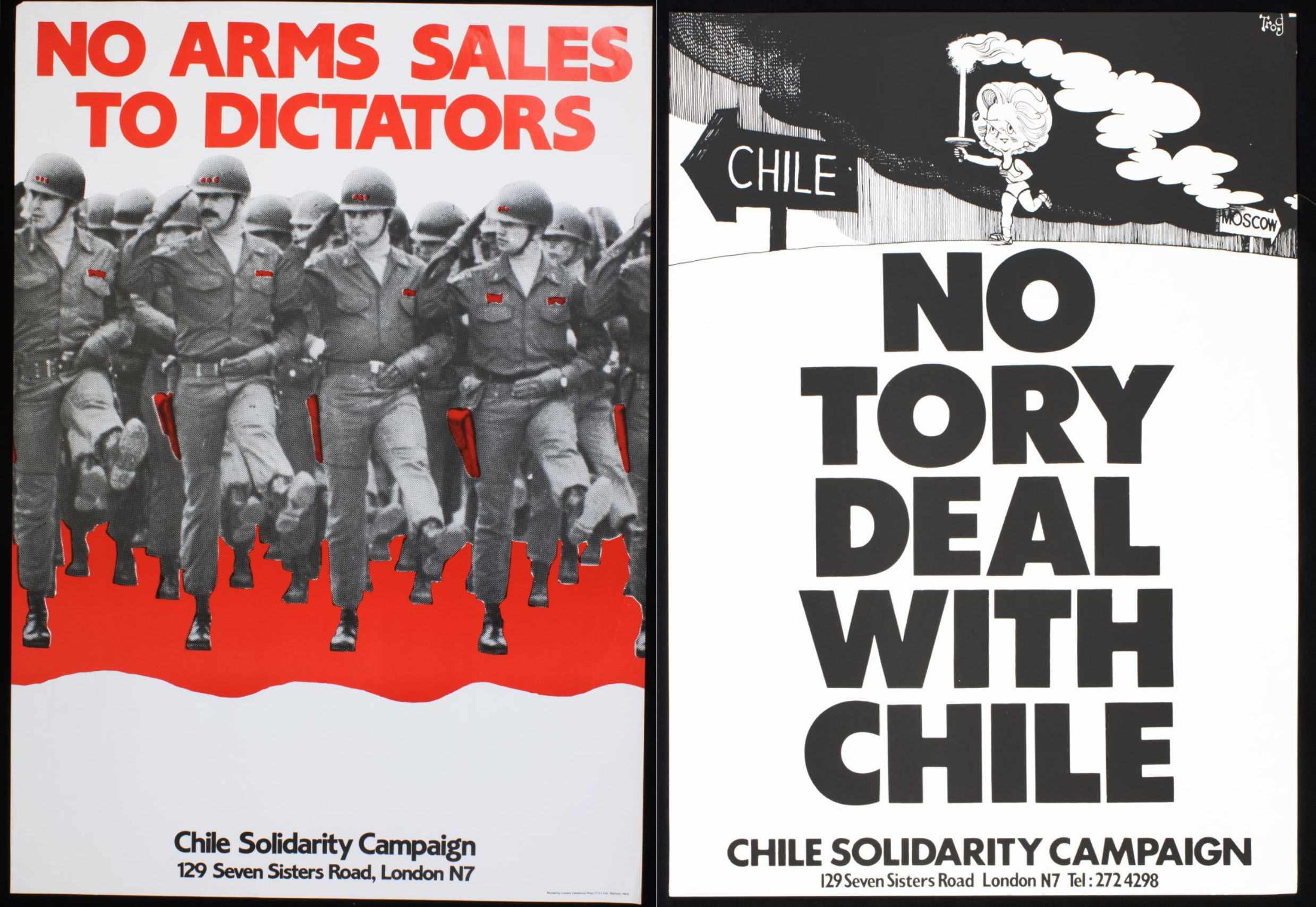
Following the Chilean coup of 11 September 1973 there was international outcry. Various individuals and organisations around the UK rallied to Chile’s aid. The Chile Solidarity Campaign (CSC) was set up in the UK in September of 1973 in response to the brutal overthrow of the democratic Chilean government. The CSC’s executive committee and that of its sister organisation, the Chile Campaign for Human Rights (CCHR), pressed their objectives through the Labour Party, and trade unions. The CCHR became a registered charity and remained apolitical, thus was able to work with a wider network of church groups and human rights organisations.
The CSC and CCHR lobbied the British government directly for the release of political prisoners, organised letter, postcard, and telegram campaigns, petitions, and delegations to the Foreign Office and both British and Chilean Embassies. Leading members of the Transport and General Workers’ Union and the Amalgamated Union of Engineering Workers joined the CSC, and the Parliamentary Labour Party formed a special working group on Chile. The campaigns highlighted the plight of trade unionists, students, teachers, and academics in Chile.
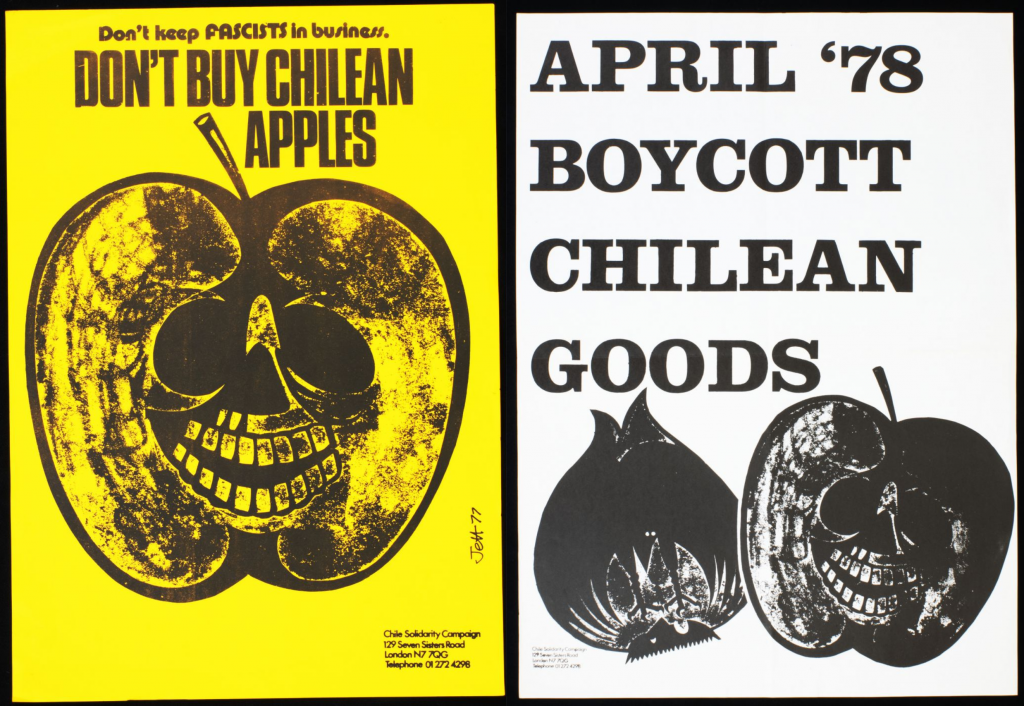
The CSC had a national team and several regional branches that consisted of a Chair, Vice Chair, and Treasurer. It was a voluntary organisation mainly funded by donations from trade unions and the public. Some public funds were allocated for the homing of refugees, but the funding was scarce and unreliable. Fundraisers often involved Chilean artists, highlighting the plight of those persecuted by the Pinochet regime. There were also campaigns to boycott Chilean goods such as apples, wine, and shoes.
During the 1980s the Chilean people began to organise and call for the expulsion of Pinochet. All dissidents were heavily repressed. The CSC campaigned alongside Chilean trade unions and grassroots organisations, supporting their campaigns and calling for the return to democracy in Chile.
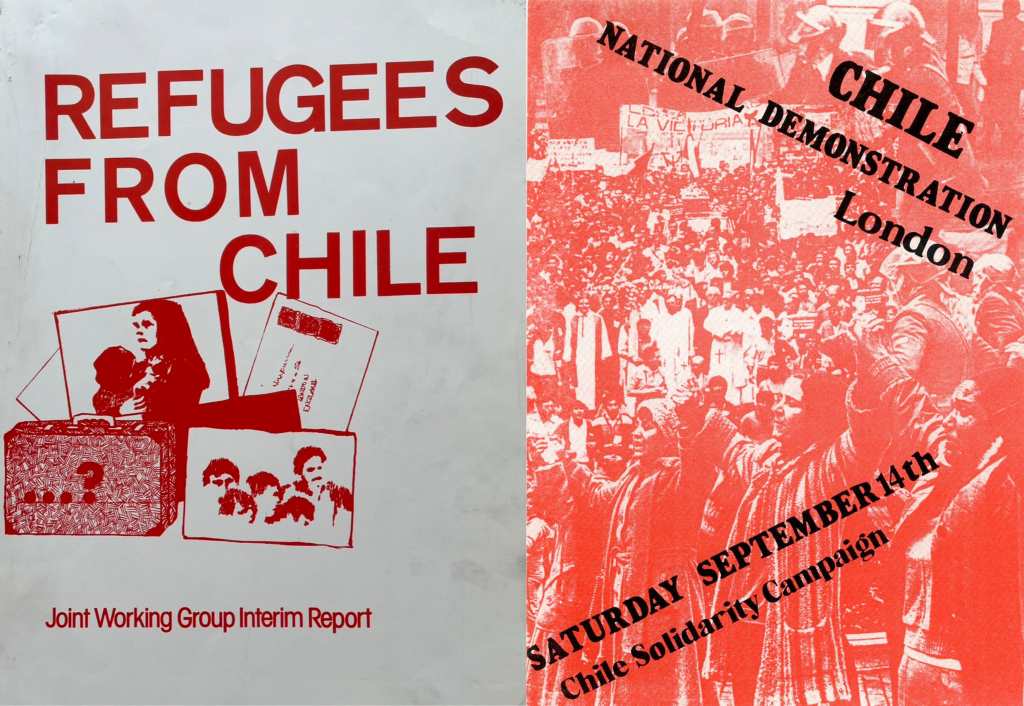
The CSC were instrumental in helping the newly arrived refugees find homes and access to services. Many of the new arrivals were processed at a hotel in central London and then housed across the country in main cities such as Edinburgh, Sheffield, Manchester, Hull, Birmingham, Cambridge, Leeds, and London. CSC branches were set up in most cities in the UK to help refugees find their feet and help campaign for missing or imprisoned relatives. Academics for Chile was formed by Chilean and British academics concerned with the human rights situation in Chile. Later, the World University Service helped over 900 Chileans to obtain grants and continue their education across universities in the UK.
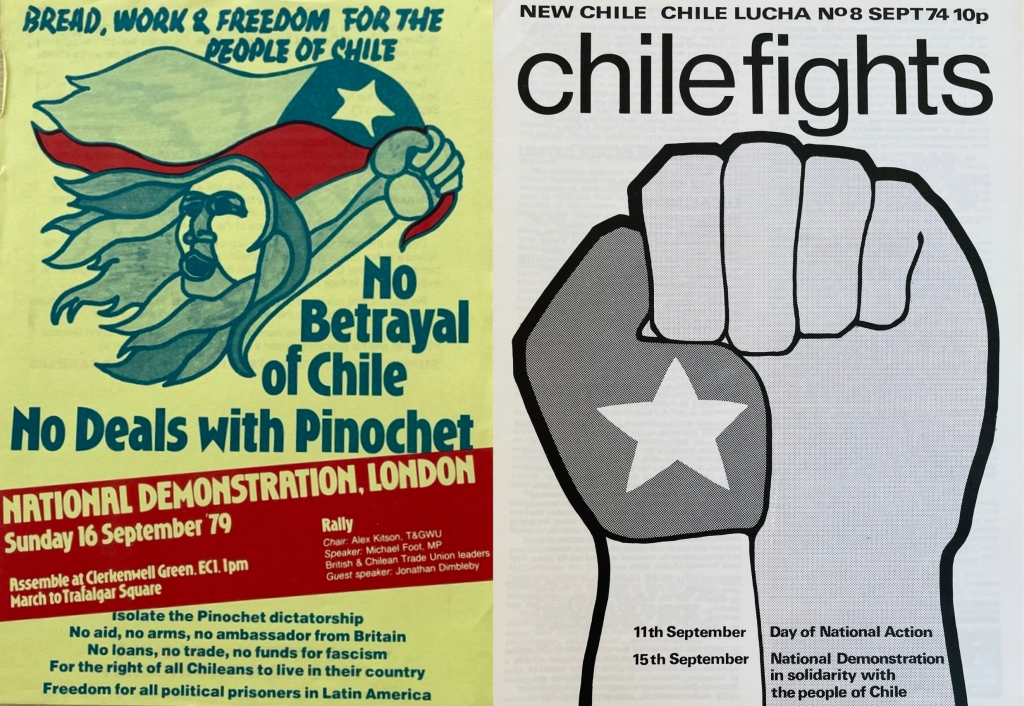
On 5 October 1988, General Augusto Pinochet held a referendum in which voters could vote ‘yes’ (to him remaining) or ‘no’ (for a democratically elected head of state). 56% voted ‘no’ and the tyrant begrudgingly allowed a transition toward democracy, albeit with several clauses, one of which was complete impunity for himself and his army. He remained Commander in Chief of the Chilean Army until 1998 and Senator for Life until 2002. The exile blacklist that had prevented refugee return for 17 years was universally lifted and the ‘retorno’ (return) began. Many Chilean refugees in the UK and across the globe returned to Chile. This meant that the campaigns wound down too. Chilean NGO Chile Democratico disbanded, and the CSC also stopped its activities.
The Chile Solidarity Campaign is now internationally renowned for its strength and success. Thanks to the efforts of its members, many lives were saved and by the time Pinochet was arrested in London in October of 1998, the British public were fully aware of the crimes committed during his dictatorship.
Carole Concha Bell is a PhD student at King’s College London and freelance writer.
Guest blogs are not curated by PHM but feature voices on topics relevant to the museum’s collection. Guest blogs do not necessarily reflect the views of PHM.
Book to visit PHM’s Archive and delve into material from the Chile Solidarity Campaign (CSC) collection.
Keep up to date with PHM’s latest blogs and upcoming events by taking the Radicals quiz to sign up to our regular e-newsletter.
An earlier version of this blog was first published in August 2023.